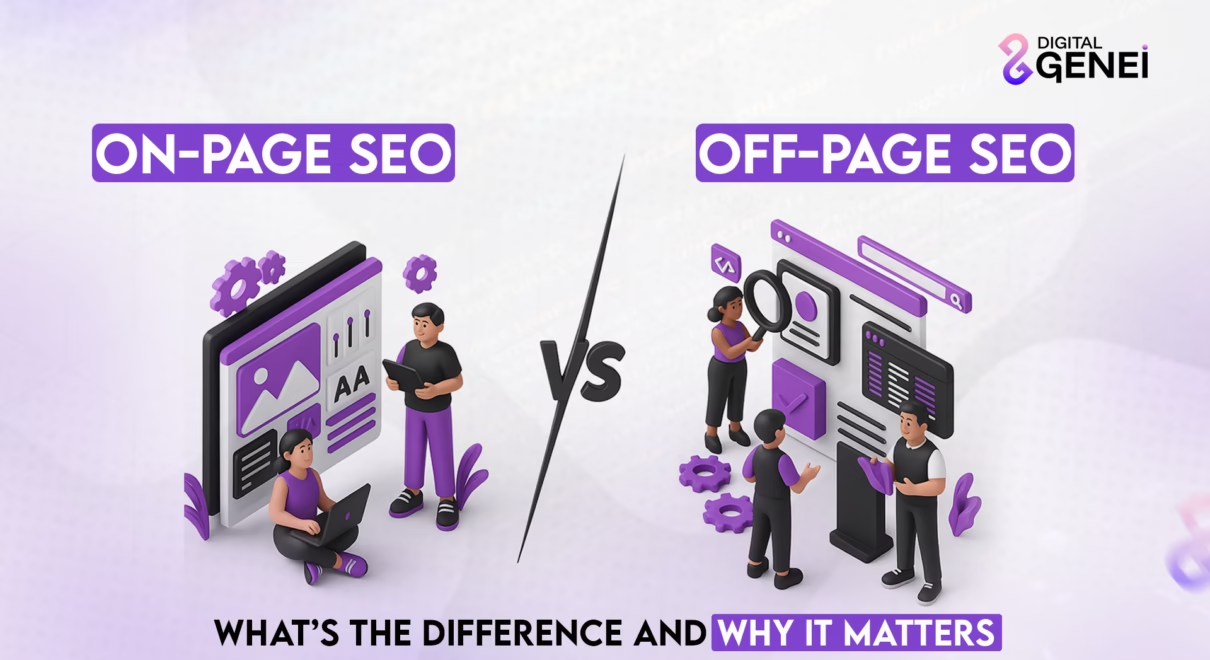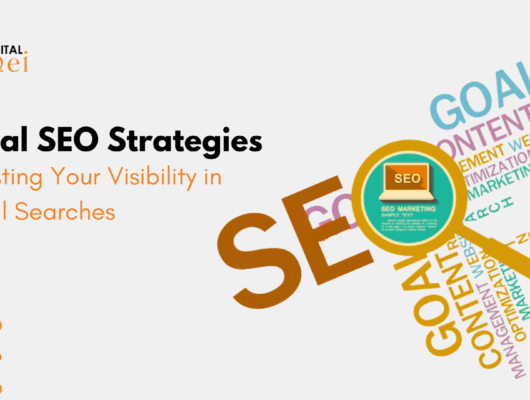If you want your website to rank high on Google, understanding the difference between On-Page SEO and Off-Page SEO is essential. Both play a vital role in your SEO strategy, but they focus on different areas. This article explains these two SEO types clearly, why they matter, and how to optimize them to boost your website’s visibility and authority in 2025.
At Digital Genei, we help businesses implement effective SEO strategies tailored to both on-site and off-site optimization, ensuring long-term growth and visibility.
What is On-Page SEO? (SEO Differences Explained)
On-Page SEO involves optimizing everything on your website to help search engines and users understand and value your content. It’s about making your pages relevant, fast, and user-friendly.
Key On-Page SEO Elements:
Keyword Optimization:
Use your main keywords like “On-Page SEO,” “SEO strategy,” and related terms naturally in titles, headings, and content. For example, include keywords within the first 25 words of your page.
Meta Tags:
Write unique meta titles and descriptions that encourage clicks and include your target keywords.
High-Quality Content:
Create original, useful content that answers users’ questions and keeps them engaged.
Internal Linking:
Link to other relevant pages on your site to improve navigation and SEO.
Pro Tip: Many websites unknowingly hurt their rankings with structural mistakes. Here are 5 common website mistakes that hurt your SEO, and how to fix them by Digital Genei.
Image Optimization:
Add descriptive alt text and compress images to speed up your site.
Technical SEO:
Improve page load speed, ensure mobile-friendliness, and optimize for Core Web Vitals. Use structured data (schema markup) to help search engines understand your content better.
On-Page SEO is the foundation of your website’s SEO health because it influences what keywords you rank for and how users experience your site.
What is Off-Page SEO? (Building Authority and Trust)
Off-Page SEO refers to all the activities outside your website that improve its reputation and authority. It tells Google your site is trustworthy and valuable.
Key Off-Page SEO Activities:
Backlink Building:
Earn high-quality backlinks from reputable websites. These links act as votes of confidence in your content. Focus on sustainable strategies like guest blogging, digital PR, and partnerships. Avoid low-quality or spammy backlinks.
Social Media Promotion:
Share your content on social platforms to increase visibility and drive traffic.
Online Reputation Management:
Encourage positive reviews and manage your brand’s presence on external sites.
Off-Page SEO helps your website rank higher by building authority and trust, which are critical ranking factors in 2025.
Why Both On-Page and Off-Page SEO Matter
Both types of SEO are essential and work best together:
On-Page SEO
- Optimizes your website’s content and structure
- Helps search engines understand your pages
- Improves user experience and engagement
Off-Page SEO
- Builds your site’s authority through external signals
- Signals trustworthiness and popularity to search engines
- Increases referral traffic and brand awareness
Think of On-Page SEO as the car, and Off-Page SEO as the fuel. Without a well-optimized site, even the best backlinks won’t help you rank well. Conversely, a great website without backlinks may struggle to compete in search results.
How to Optimize On-Page and Off-Page SEO for 2025
On-Page SEO Tips:
- Use your target keywords naturally in titles, headings, and content, especially near the beginning
- Write unique, keyword-rich meta titles and descriptions
- Improve your site speed and mobile usability to meet Core Web Vitals standards
- Add internal links to related articles or pages
- Use descriptive alt text for images and compress them for faster loading
- Implement structured data (schema markup) for enhanced search results
- Use tools like Google Search Console to monitor your SEO performance
Off-Page SEO Tips:
- Create high-quality, link-worthy content such as guides, infographics, and case studies
- Reach out to authoritative websites for guest posts or collaborations
- Promote your content actively on social media channels
- Manage your online reputation by encouraging positive reviews and responding to feedback
- Avoid low-quality backlinks and focus on natural link-building strategies
Conclusion
Understanding the difference between On-Page and Off-Page SEO is key to a successful SEO strategy in 2025. On-Page SEO focuses on optimizing your website’s content and technical setup, while Off-Page SEO builds your authority through backlinks and social signals. Combining both ensures your website ranks higher, attracts more organic traffic, and provides a great user experience.
By following the tips outlined here and staying updated with SEO trends, you can create a powerful SEO strategy that helps your site rank easily and sustainably on Google. For expert support, trust Digital Genei, your partner in building optimized, mistake-free, search-ready websites.






